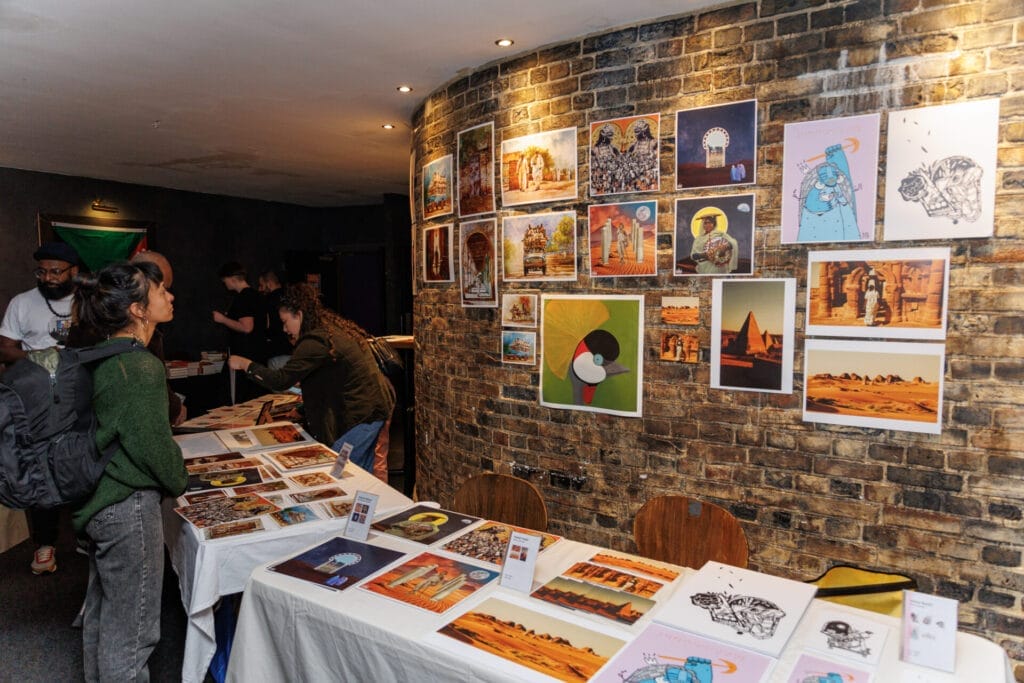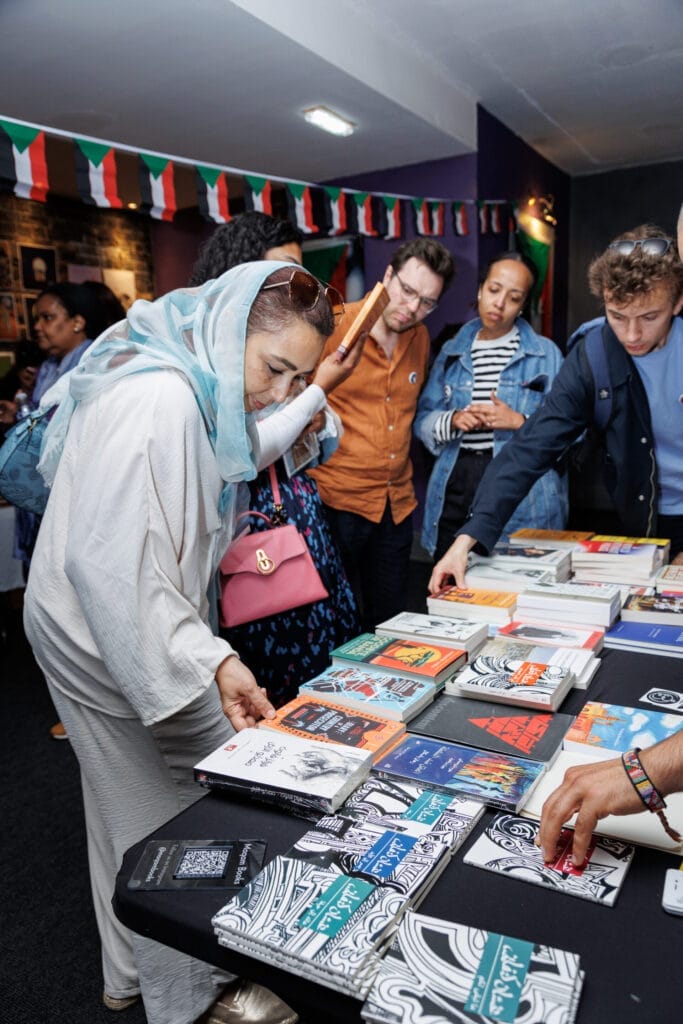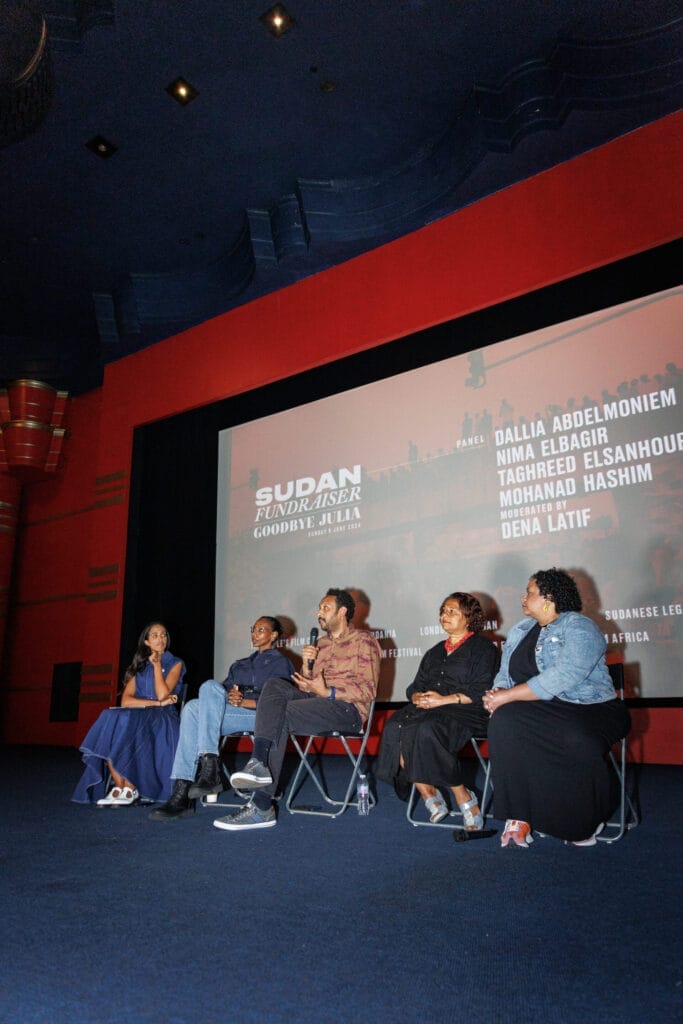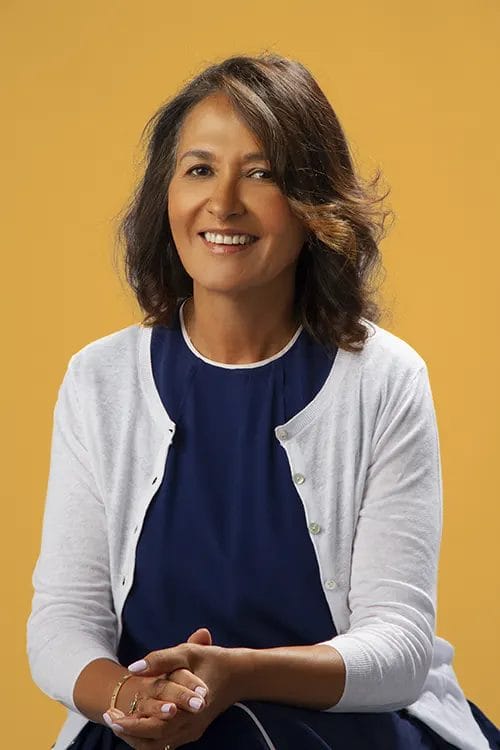On June 9th there was a private screening of prizewinning Sudanese film ‘Goodbye Julia’ at the Genesis Cinema on Mile End Road in London.
This screening was organised as a fundraiser and thousands of pounds were raised for Hadhreen, a grassroots Sudanese organisation which operates community kitchens across besieged Khartoum.
The event both celebrated the best of Sudanese culture and raised critical awareness about the ongoing war in Sudan. Over 600 people attended, including hundreds of the Sudanese diaspora. Many people were reunited at the event for the first time since fleeing Sudan last year.
Several Sudanese artists displayed prints and lithographs at the event, with proceeds also helping to support displaced artists stranded in Ethiopia and Egypt. Hussein Merghani’s watercolours, of typical scenes from Sudanese towns and villages, were very popular. Yasmin Elsadig’s (KICS Class of 2010) graphic prints, which reimagine symbols of Sudanese heritage and iconography, were also in high demand. Alaa Satir, whose feminist street art featuring Sudanese ‘kandakas’ was an iconic feature of the 2019 revolution, was also featured.

Food stalls sold some favourite Sudanese snacks including ‘Ful’ and Falafel wraps and baklawa. A Sudanese henna artist shared this decorative tradition with the attendees. The full breadth of Sudanese craftsmanship and artistry was on display, as jewellery, soap and clothes makers ran stalls.
In addition, several solidarity groups manned stalls, including ‘London for Sudan’ and ‘Madaniya’. Attendees were encouraged to write to their local representatives, and avenues for solidarity were discussed. A poster-making workshop was run, with posters created for upcoming protests.

Dena Latif introduced the film and outlined the historical context, set between the death of John Garang, a Sudanese leader who championed the vision for an inclusive Sudan, and the eventual separation of South Sudan in 2011.
Watching this film was incredibly emotional for the very many audience members who had fled Khartoum, including several of our students. Watching scenes of familiar streets full of bustling life, which are now ransacked, looted and destroyed; meant that many in the audience were left in tears.
Goodbye Julia, which tells the tale of a Northern and Southern Sudanese woman brought together by tragedy, highlights some of the societal issues which have plagued Sudan since its inception. The film critically examines the racial and ethnic divisions suffered across the Sudanese state, and the inability of the nation to unite it’s incredibly diverse population. A failure which has contributed to today’s war.
Following the film, the audience stayed on to listen to an insightful discussion by a panel of experts about how the issues raised in the film resonate strongly with the current disaster that has befallen the country.

Niima Elbagir, an award-winning Sudanese journalist for CNN, was a mine of information, having reported from the front line for CNN over the last year. Niima had interviewed Hemedti (leader of the Rapid Support Forces) before his rise to power. Though she provided thoughtful insight into the bleak crisis, she shared her immense pride in the ways the Sudanese have rallied together, in the absence of international support, to help one another.
Her optimism was in stark contrast to the view of Mohanad Hashim, a Sudanese BBC journalist who covered the 2019 revolution. It was his opinion that the ‘writing was on the wall’ from at least 2019, and that the Sudanese community had looked the other way.
Dalia Abdelmoneim, a Sudanese activist and political thinker made the salient point that the Sudanese war is not the ‘forgotten war’ as coined by the Western press, but rather the ignored war. That it was an inconvenience to the international community who continue to look away.
Taghreed El Sanhouri, who made films on the Darfur genocide of 2003, described how, visiting the Sudan for the first time as an adult, she was struck by how heavily the legacy of slavery continued to impact the country’s identity (or lack thereof).
The panellists were in agreement that it is of the utmost importance that the attendees, and those beyond, continue to talk and think about Sudan. That it is the responsibility of those outside of Sudan to do what is within their power to keep it in the public consciousness.
Dena is a graduate of KICS (Class of 2015) who has studied history and law in the UK and USA and currently works at a human rights law firm in London. She was assisted with all the organisation and preparation by her KICS classmate, social anthropologist and political risk analyst, Reem Awad. We were also delighted to welcome several other KICS graduates and former students to the event. These included Sanaa Makawi (Class of 2013), Aamin Alasaad (Class of 2015), Layla Abdalla-McDaid (Class of 2023), Mazin Asim (Class of 2012), Omar Osama (Class of 2017), Salma Marouf (Class of 2012).
Thanks to all the many organisers involved in enabling this bittersweet event to go ahead. It brought people together, reminded them of what they have lost and hopefully will galvanise future action to help save Sudan from its current disastrous situation.



